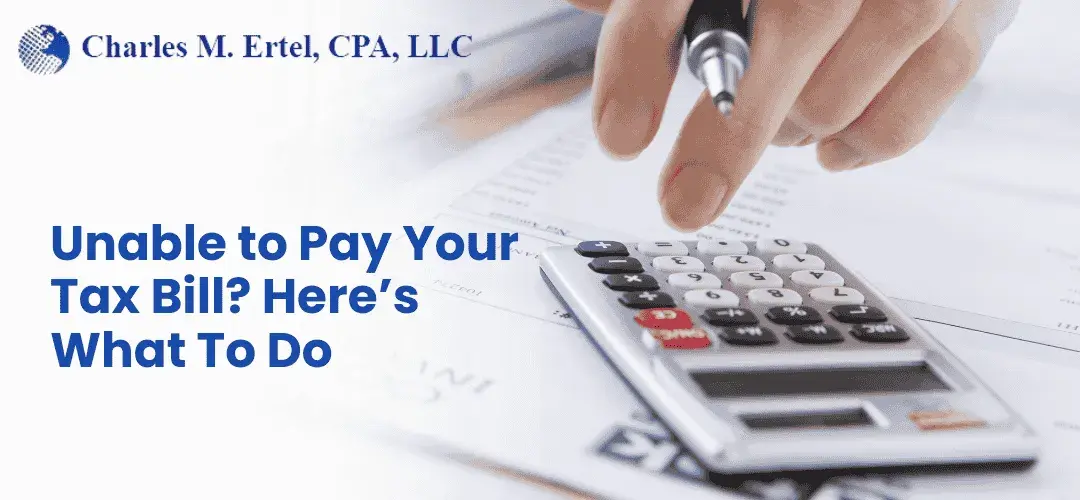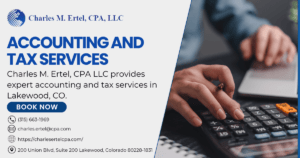Facing a tax bill you cannot pay can be a daunting experience, especially for individuals and small business owners in Lakewood, CO. The stress of owing Money to the IRS can feel overwhelming, but knowing that you have options is essential. Ignoring the problem will worsen it, leading to penalties, interest, and potential collection actions. Instead, take proactive steps to address your tax situation.
The first thing to understand is that the IRS offers various options for taxpayers who cannot pay their tax bills in full. Whether you are an individual or a small business owner, solutions can help you manage your tax obligations. Engaging with a small business tax accountant or a CPA accountant near me can provide valuable guidance tailored to your situation.
In this article, we will explore the options available for paying your tax bill, including short-term payment plans, long-term installment agreements, offers in compromise, and the possibility of temporarily delaying the collection process. By understanding these options, you can make informed decisions and take control of your tax situation.
What Are Your Options for Paying Your Tax Bill?
If you cannot pay your tax bill, the IRS provides several options to help you manage your tax debt. Here are some of the most common solutions:
Short-Term Payment Plan: If you can pay your tax bill within 120 days, you may qualify for a short-term payment plan. This option allows you to pay your balance in full without incurring additional fees. However, interest will continue to accrue on the unpaid balance until it is paid in full. To set up a short-term payment plan, you can apply online through the IRS website or contact them directly.
Long-Term Installment Agreement: If you need more time to pay your tax bill, you can request a long-term installment agreement. This option allows you to pay your tax debt in monthly installments over an extended period, typically up to 72 months. While this option provides more flexibility, it may come with setup fees and interest charges. To apply for a long-term installment agreement, use the IRS Online Payment Agreement tool or submit Form 9465.
Offer in Compromise: An offer in compromise (OIC) program allows you to settle your tax debt for less than the total amount owed. This option is typically available to taxpayers who demonstrate that paying the total amount would create a financial hardship. To qualify for an OIC, you must meet specific criteria and provide detailed financial information. Working with a business tax accountant near me can help you navigate this process and improve your chances of acceptance.
Temporarily Delay the Collection Process: If you are experiencing financial hardship, you may be able to request a temporary delay in the collection process. This is usually referred to as the currently not collectable status. While this does not eliminate your tax debt, it can provide temporary relief from collection actions. To request this status, you must provide documentation of your financial situation to the IRS.
Exploring these options can help you find a solution for your financial situation. Consulting with accountants or a certified public accountant near me can provide you with the expertise needed to navigate these options effectively.
Request a Short Term Payment Plan
If you cannot pay your tax bill in full but cannot pay it within 120 days, a short-term payment plan may be the best option. This plan allows you to pay your tax balance without incurring additional fees, although interest will still accrue on the unpaid amount until it is settled.
You can apply through the IRS website to request a short-term payment plan. The online application is straightforward and will guide you through the necessary steps. You must provide your personal information, including your Social Security number and details about your tax liability.
Once your application is submitted, the IRS will review your request and notify you of its decision. If approved, you will receive instructions on how to make your payment. Adhering to the payment timeline is essential to avoid penalties or further collection actions.
If you need clarification on the process or assistance, consider contacting a small business tax accountant. They can help you understand your options and complete the application correctly. Additionally, if you are:
A business owner.
Utilizing accounting and tax solutions can help you manage your finances more effectively.
Making it easier to pay your tax obligations.
In summary, a short-term payment plan is viable for those who can pay their tax bill within 120 days. Applying online and following the necessary steps allows you to manage your tax debt without incurring additional fees.
Request a Long-term Installment Agreement
If you need more time to pay your tax bill, a long-term installment agreement may be the right solution. This option allows you to pay your tax debt in monthly installments over an extended period, typically up to 72 months. This flexibility can particularly benefit individuals and small business owners in Lakewood, CO, facing financial challenges.
To request a long-term installment agreement, use the IRS Online Payment Agreement tool or submit Form 9465. The online application is user-friendly and will guide you through the necessary steps. You must provide your personal information, including your Social Security number and details about your tax liability.
Once your application is submitted, the IRS will review your request. If approved, you will receive a confirmation along with the terms of your installment agreement, including the monthly payment amount and due dates. It’s crucial to make your payments on time to avoid penalties and maintain the deal.
While this option benefits from spreading out your payments, it’s important to note that interest and penalties may still accrue on the unpaid balance. Therefore, it’s advisable to work with a business accountant near me to help you determine the best payment amount that fits your budget while minimizing the overall cost of your tax debt. Additionally, if you are:
- A small business owner.
- Utilizing accounting and tax solutions can help you manage your cash flow effectively.
- Ensuring that you can meet your tax obligations while maintaining your business operations.
- By staying organized and proactive, you can easily navigate your tax responsibilities.
In conclusion, a long-term installment agreement is an excellent option for those who need more time to pay their tax bill. By applying through the IRS and adhering to the payment schedule, you can manage your tax debt without overwhelming financial strain.
Offer In Compromise
An Offer in Compromise (OIC) is a program the IRS offers that allows taxpayers to settle their tax debt for less than the total amount owed. This option mainly benefits individuals and small business owners who demonstrate that paying the total amount would create financial hardship.
To qualify for an OIC, you must meet specific criteria, including demonstrating an inability to pay your tax debt in full. The IRS will require detailed financial information, including your income, expenses, assets, and liabilities. This information assesses your financial situation and determines whether an OIC is appropriate.
Applying for an OIC can be complex, and working with a small business tax accountant or a CPA accountant near me is highly recommended. These professionals can help you gather the necessary documentation, complete the application accurately, and present your case effectively to the IRS.
When submitting an OIC, you must include a non-refundable application fee and the first payment of your proposed offer. If the IRS accepts your offer, you will be required to adhere to the terms of the agreement, which may include making additional payments or complying with future tax obligations.
It’s important to note that not all OIC applications are accepted, and the IRS has strict guidelines for approval. However, if you qualify, this option can significantly reduce your tax burden and provide a fresh start.
In summary, an Offer in Compromise can be a viable solution for those facing financial hardship. By working with a qualified tax professional, you can navigate the application process and improve your chances of acceptance.
Temporarily Delay the Collection Process
If you are experiencing financial hardship and cannot pay your tax bill, you may be able to request a temporary delay in the collection process. This status is often called “currently not collectible” (CNC) and can provide relief from collection actions, such as wage garnishments or bank levies.
You must provide the IRS with documentation of your financial situation to request CNC status. Such information that has to do with you may include your income, your expenditure, and any other financial information that may be required. The IRS will review your request and determine whether you qualify for this temporary relief.
While being in CNC status does not eliminate your tax debt, it can provide the breathing room needed to improve your financial situation. During this time, the IRS will generally not pursue collection actions, allowing you to focus on getting back on your feet.
It’s important to remember that interest and penalties will continue to accrue on your unpaid tax debt, so it’s advisable to work with a business tax accountant near me to develop a plan for addressing your tax obligations once your financial situation improves.
Additionally, utilizing accounting tax services can help you manage your finances more effectively, ensuring you can meet your tax obligations in the future. Staying organized and informed allows you to navigate your tax responsibilities more efficiently.
In conclusion, requesting a temporary delay in the collection process can provide much-needed relief for those facing financial hardship. By working with a qualified tax professional, you can navigate this process and focus on improving your financial situation.
FAQs
Can I negotiate with the IRS myself?
Yes, you can negotiate with the IRS, but having a tax professional can improve your chances of a favorable outcome and help you navigate the complexities of tax negotiations.
How to get out of paying federal taxes?
You cannot simply avoid paying federal taxes, but options like an Offer in Compromise or a payment plan can help you manage your tax debt if you’re facing financial hardship.
Who is eligible for the IRS hardship program?
Individuals experiencing significant financial difficulties may qualify for the IRS hardship program, which can provide relief from collection actions. Documentation of your financial situation is required to apply.



